I gathered a list of 667 different books from 31 different recommendation lists. The lists I looked at were non-specific LGBT+ or queer (as an umbrella term) book rec lists - general meaning that they were not narrowed to a specific year ("best of 2022"), not focused on a specific demographic ("best trans books"), and not focused on a specific genre ("best queer sci-fi"). I excluded "cataloguing" type of lists - lists dedicated to simply documenting what LGBT+/queer books exist.
If a book appeared multiple times in one list, I still only counted it once. (I may change this next time.)
I inputted every book into a spreadsheet manually, along with the author, genre, date released, and an additional note indicating if it was a comic/graphic novel/manga.
Genre Labeling
I used Goodreads as a genre indicator and, when Goodreads tags were ambiguous (usually because top tags included "Young Adult" AND "Adult"), I checked how the book is sorted on Amazon.
General: is the catch-all for non-genre fiction; literary/contemporary/classics. If it was set in the present when it was written, it's "general", even if it seems "historical" now. I went through and checked historical for errors, but have not re-checked "general" as it is too much work and I do not feel like it. Also I only noticed Maurice was miscategorized as "historical" after I made all my charts and stuff. Sorry. It's an edge case anyway (written in 1910s, set contemporary to them, but not published until 1971) (I'd fix it but I'm too lazy).
"Literary fiction" being lumped in with mass-market light reading might seem wrong, but "literary" is more of a subjective descriptor of style than a genre and often the difference between something being "literary" and "not literary" is just a matter of time passing.
Kids & YA: "Kids" is books for ages up to and including MG. I included "NA" (New Adult) under "YA" because in my experience NA is indistinguishable in terms of style, genre expectations, tone, and audience from YA, and "young adult" and "new adult" mean the same thing anyway. "YA" and "kids" were not differentiated by subgenre (YA fantasy, YA romance, etc), because I did not think it would be interesting and I just did not feel like it.
There are a few genres with only one or two entries: Magical Realism (2), Adventure (1), and Erotic (1). I would've liked to put them in broader categories, but sometimes something just is what it is. There is probably some magical realism which is in general or SFF, but these two were primarily considered magical realism genre-wise and others were not.
473 of the 667 books were only present on 1 rec list; that's 70.9%!
So, let's look at genre! On the left are the full-list charts; on the right is the much smaller list of books with more than one recommendation.
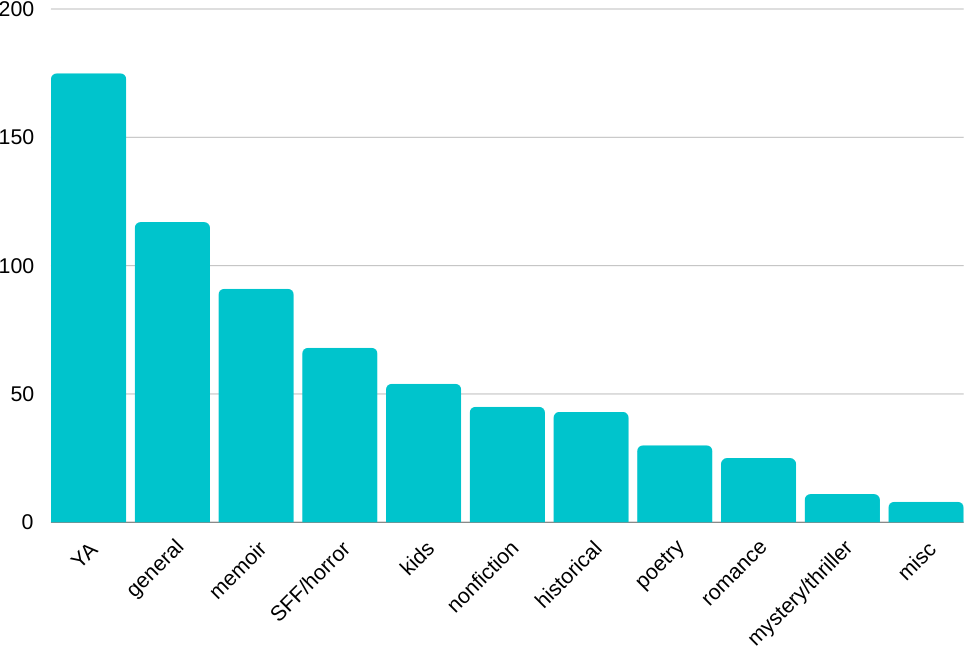
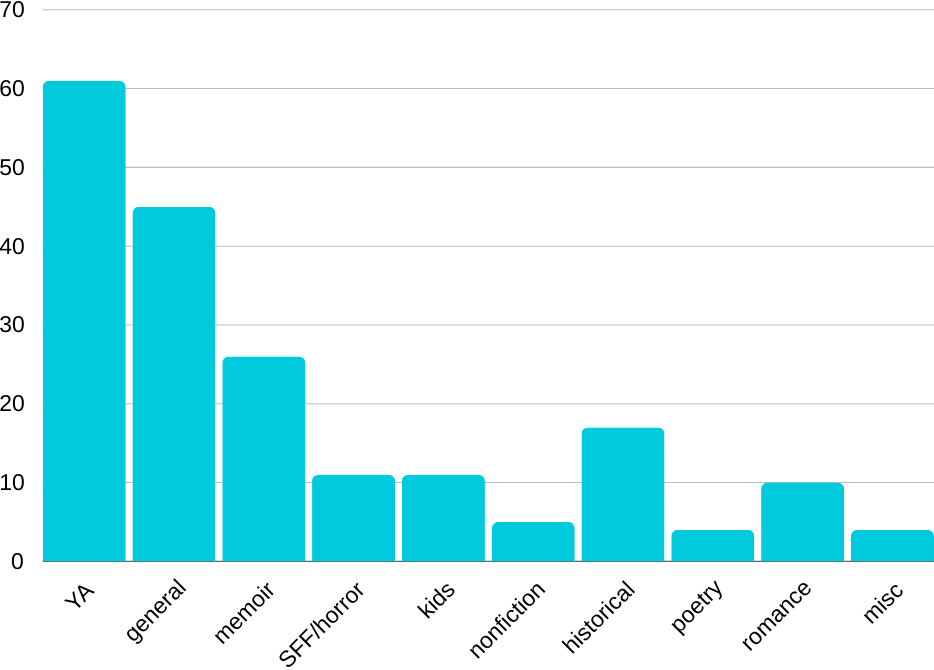
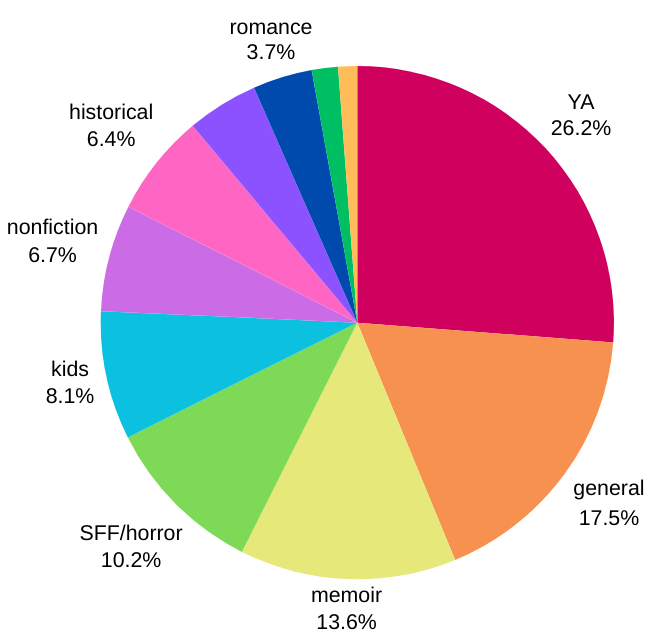
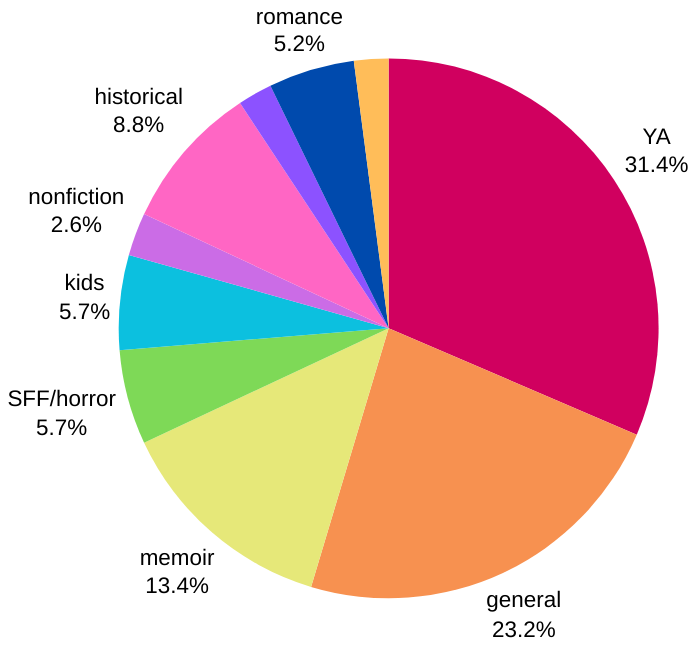
For the general list, that's 175 YA novels, 117 general fiction, 91 memoirs, 68 horror/sci-fi/fantasy, 54 kids books, 45 nonfiction, 43 historical fiction, 30 books of poetry, 25 romance novels, 11 mystery/thriller novels, and 8 miscellaneous. In the abbreviated list, it's 61 YA, 45 general, 26 memoir, 17 historical, 11 horror/SFF, 11 kids, 10 romance, 5 nonfiction, 4 poetry, and 4 miscellaneous.
My feeling about YA was, in fact, mostly correct! It makes up the biggest slice of the pie in both lists. Memoir is indeed a pretty big chunk as well! It isn't as dramatic as I expected, but it's still significant. I'm surprised that romance novels aren't more frequently recommended, considering the popularity of Red, White, and Royal Blue and the general hugeness of the romance novel industry, both traditionally-published and self-published on Amazon.
If you're curious about the tiny misc slivers - in the main list that's 1 adventure novel (Flaming Iguanas by Erika Lopez), 1 anthology of erotica (Kink: Stories), 2 magical realism novels (Fierce Femmes and Notorious Liars by Kai Cheng Thom and Nuclear Family by Joseph Han), and 4 plays (Angels in America, Indecent, Torch Song Trilogy, and The Importance of Being Ernest). In the smaller list it's 2 thrillers (reshelved into misc), 1 play, and 1 magical realism.
Speaking of plays, let's take a look at medium!
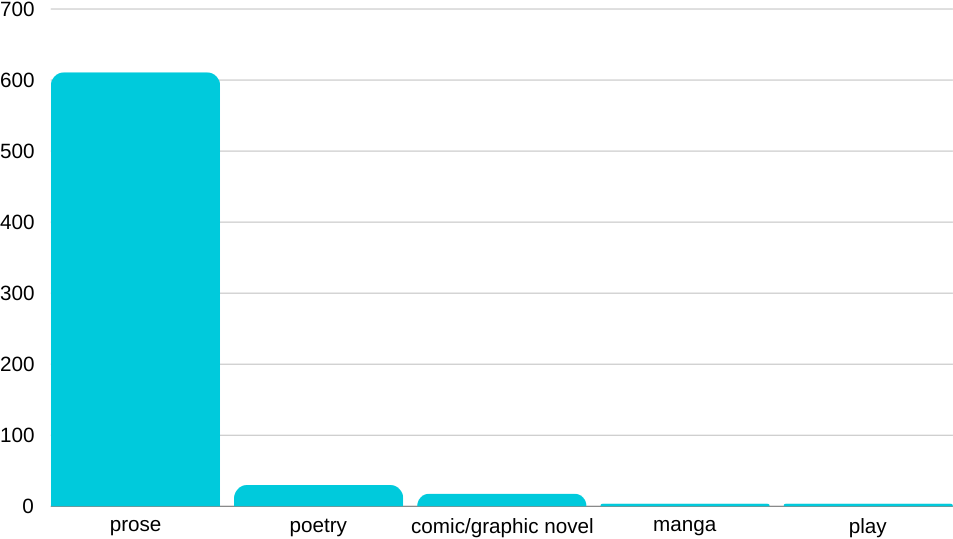
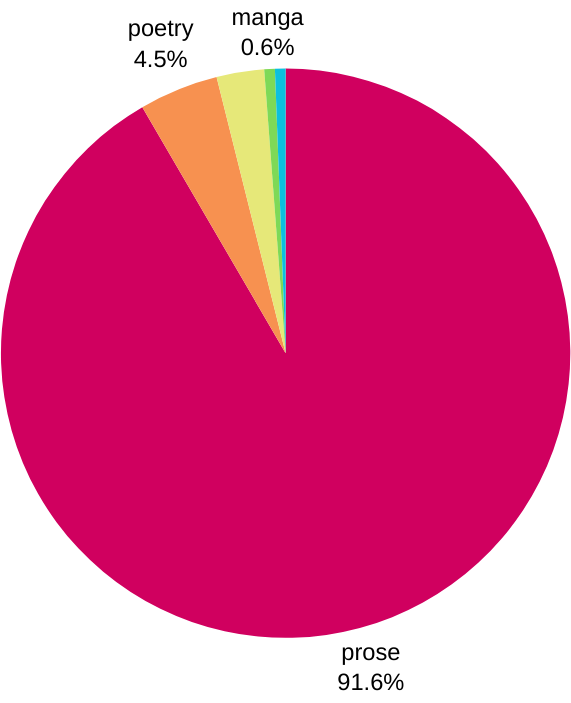
611 prose/normal writing, 30 books of poetry, 18 comics/graphic novels, 4 manga, and 4 plays. In both charts the normal style is so overwhelming (91.6%!) that the manga and plays are barely visible with their itty-bitty slivers of 0.6%, haha.
12 of the 18 comics/graphic novels recommended are for children - 5 for younger kids, 7 YA.
Out of the non-prose books, 4 books of poetry, 4 comics/graphic novels, and 1 play received more than one recommendation. None of the 4 manga on the list received more than one recommendation.
Time for time.
I added the "year published" column to my spreadsheet belatedly, because I felt like there was somewhat of a recency bias; as I was going through the lists, I noticed an awful lot of things that came out just in the last couple of years. Again, I was curious if that impression I'd gotten was accurate. It was!

.png)
252 books on the list are from the 2020s, 275 from the 2010s, and then there's an extremely steep dropoff. 31 from the 2000s, 37 from the 90s, 20 from the 80s, 16 from the 70s, 10 from the 60s, only 8 from the 50s, and then 16 from the entire rest of human history. Whoa!
Here's a pie chart with slightly different slices of time:
.png)
326 recommended books were published from 2019-2024 (the last five years), 181 were from 2013-2018, 51 from from 2000-2012, 103 from the entire 20th century, and 6 were from any time before 1900. 76% of LGBT+ books considered worth reading were published after I started college in 2013!
Those same numbers for just the 194 books with more than one rec:
.png)
.png)
Ahh, the encroaching recent times!! The percentages are pretty similar actually, haha. There's a bit of notable movement, but nothing huge, much like with the other chart somparisons.
Putting time and genre together, a full 10% of all recommendations (70 books) are YA novels published in the last five years!
Let's revisit number of recommendations per book; 70.9% of books only received one recommendation, so let's take a look at things that got more than one:
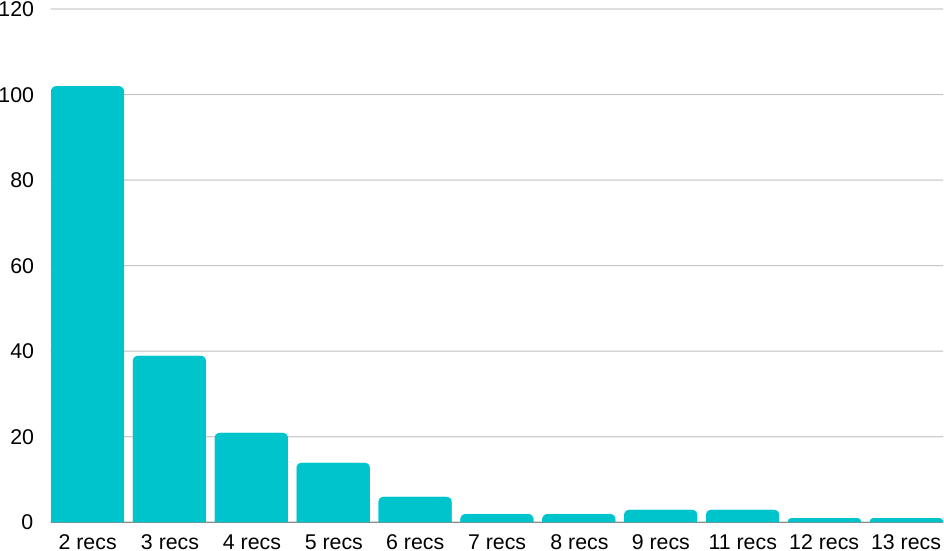
Actually about what you'd expect, I think! 1 rec is most common, and it goes in predictable descending order from there (mostly).
The Top Ten Most Rec'd Books:
1.
Giovanni's Room by James Baldwin (13 recs) | General, p.1956
2.
Aristotle and Dante Discover the Secrets of the Universe by Benjamin Alire Saenz (12 recs) | YA, p.2012
3.
Fun Home by Alison Bechdel (11 recs) | Memoir + Comic, p.2006
4.
Red, White, & Royal Blue by Casey McQuiston (11 recs) | Romance, p.2012
5.
Detransition, Baby by Torrey Peters (11 recs) | General, p.2021
6.
The Color Purple by Alice Walker (9 recs) | General, p.1982
7.
The Song of Achilles by Madeline Miller (9 recs) | Historical, p.2011
8.
Heartstopper by Alice Oseman (9 recs) | YA + Comic, p.2016
9.
The Price of Salt by Patricia Highsmith (8 recs) | General, p.1952
10.
Less by Andrew Sean Greer (8 recs) | General, p.2017
Here's two pie charts of the top ten! A bit silly, since it's only 10 things, but I like making charts.
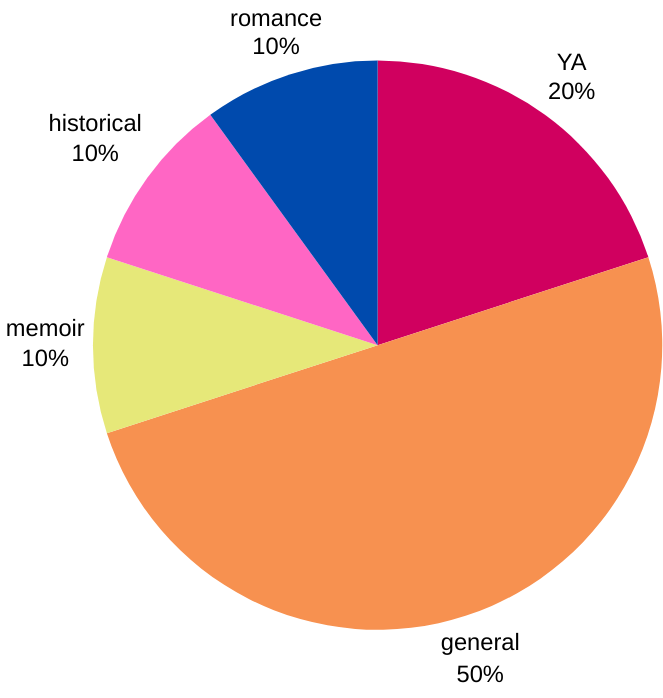
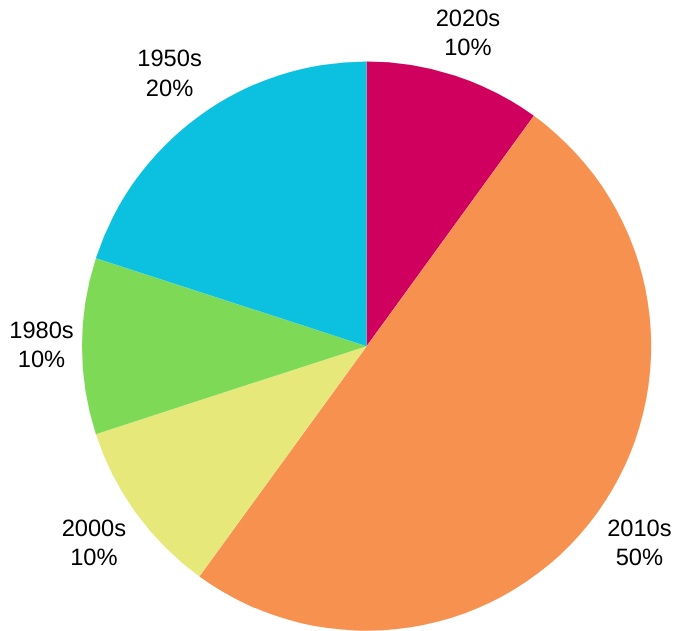
Neat!
Since the full list of 667 books and the shorter list of 194 books with 2+ recommendations are statistically quite similar, it's interesting that the top ten most popular books are not really representative - this top ten list is quite diverse in terms of time period, something that isn't borne out at all by the list overall, and we also see a romance novel in the top 10, Red, White, and Royal Blue! That might make it seem like romance is one of the most popular things, but in fact there are only two romance novels in the top 50 most-recommended books: Red, White, and Royal Blue, of course, and One Last Stop by Casey McQuiston.
This isn't to say that the other books don't have romance as a focus - they do! But Romance (the genre) and romance (the topic) are very different beasts. While Heartstopper primarily focuses on the romantic relationship of the two leads, it is not a Romance Novel; the same is true for The Song of Achilles (or so I've been led to believe.)
Fun Home and Heartstopper are also the only two comics for a good long while - the next comic on the list is all the way down at number 180.
The Next Bunch
11.
In The Dream House by Carmen Maria Machado (7 recs) | memoir, p.2019
12.
Felix Ever After by Kacen Callender (7 recs)| YA, p.2020
13.
Call Me By Your Name by Andre Aciman (6 recs) | general, p.2007
14.
Rubyfruit Jungle by Rita Mae Brown (6 recs) | general, p.1973
15.
Maurice by EM Forster (6 recs) | historical, p.1971
16.
How to Write an Autobiographical Novel by Alexander Chee (6 recs) | memoir, p.2018
17.
They Both Die at the End by Adam Silvera (6 recs) | YA, p.2017
18.
Juliet Takes a Breath by Gabby Rivera (6 recs) | YA, p.2016
19.
The Guncle by Steven Rowley (5 recs) | general, p.2021
20.
Nevada by Imogen Binnie (5 recs) | general, p.2013
21.
Oranges are not the Only Fruit by Jeanette Winterson (5 recs) | general, p.1985
22.
Stone Butch Blues by Leslie Feinberg | general, p.1993
23.
Fairest by Meredith Talusan (5 recs) | memoir, p.2020
24.
Girls of Paper and Fire by Natasha Ngan (5 recs) | YA, p.2018
25.
Fingersmith by Sarah Waters (5 recs) | historical, p.2002
26.
The Guncle by Steven Rowley (5 recs) | general, p.2021
27.
Gideon the Ninth by Tamsyn Muir (5 recs) | SFF, p.2019
28.
The Seven Husbands of Evelyn Hugo by Taylor Jenkins Reid (5 recs) | historical, p.2017
29.
Orlando by Virginia Woolf (5 recs) | historical, p.1928
Cutting it off there because Orlando is followed by a 21-way tie of books with 4 recs and that's a bit too unwieldy I think!
Historical Publishing Rates
A few fruitless attempts at googling revealed to me that there is no one unified list of all LGBT+ books ever published or even any that counted them by year or decade, so I spent all day bashing together a catalogue, combining the catalogues of a few LGBT libraries with wikipedia's lists of LGBT+ literature published by decade & year. I still do not have a comprehensive list of all LGBT+ books ever published, but 7,947 seems like a pretty good sample size for my purposes. Really there are 8200+, but I got sick of consolidating titles and manually inputting information for every individual book and gave myself permission to bail.
These collections are far from perfect - there are duplicates, non-LGBT books, second editions, incorrect dates, typos, et cetera. I did my best, but I must emphasize that 7,947 is a very large number of things. So! These numbers have to be taken as approximate, even more so than the rest.
I could go through and individually label every book with a genre, but it would take approximately one million years (read: a couple of days) and I don't feel like doing that. Information about genre is thus jettisoned to the discussion section along with all the other unscientific ponderings. (I did have to at least glance at every single book while assembling the list, so I have a vague sense of how things are distributed genre-wise.)
Caveats provided! Let's take a look at what I found!
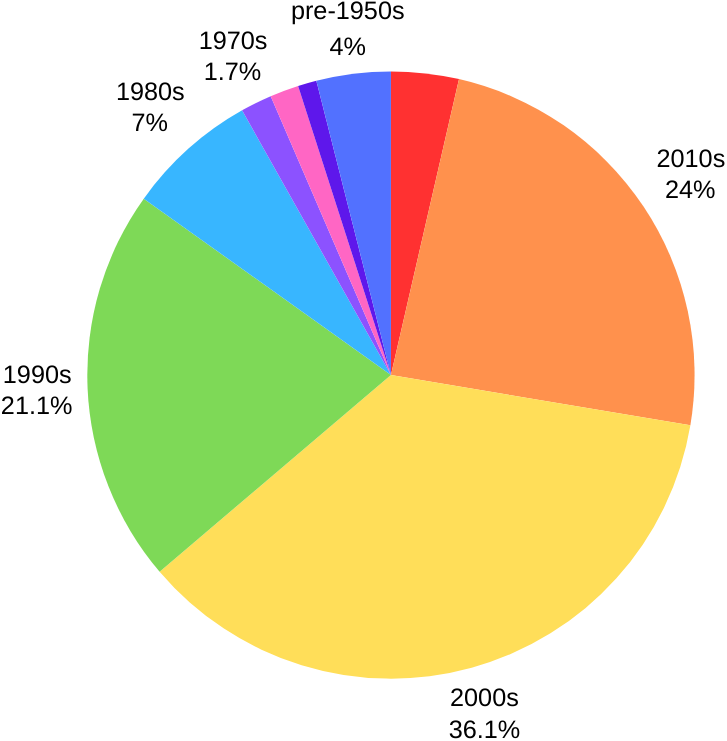
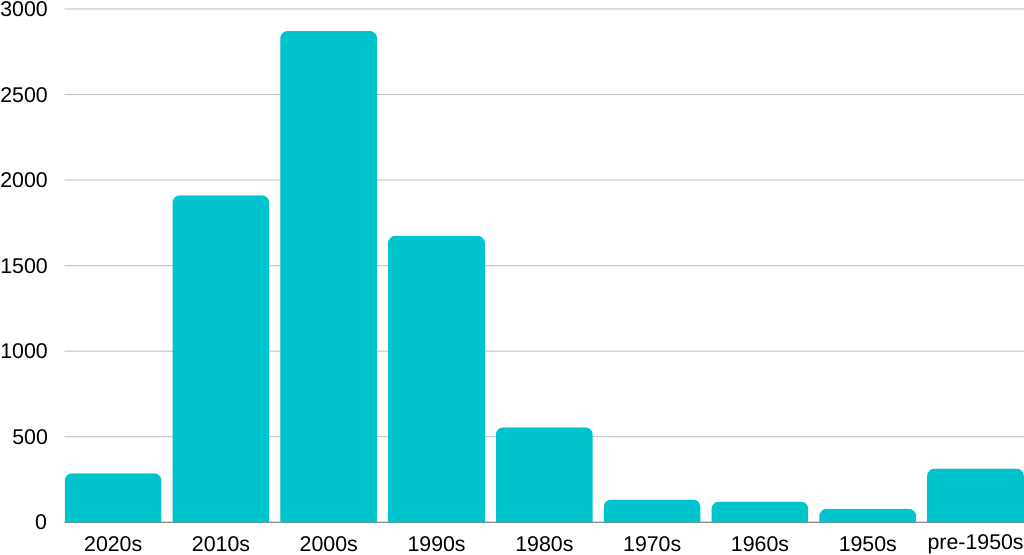
That's 286 published in the 2020s (3.6%), 1,911 in the 2010s (24%), 2,872 in the 2000s (36.1%), 1,675 in the 1990s (21.1%), 555 in the 80s (7%), 133 in the 70s (1.7%), 122 in the 60s (1.5%), 79 in the 50s (1%), and 314 pre-1950s (4%).
As mentioned earlier, 76% of recommendations are from 2013 and late. That's only 19.6% of books. Approximately 88.1% of LGBT+ books published in the 2020s are recommended reading (252 out of 286); only 1.01% of books published in the 00s are (31 out of 2,872).
Good Books vs Good Gay Books
Next let's compare my collected list of recommended books to this list of the "greatest books of all time", which is similarly sourced from a ton of different recommendation lists. There are 500 books on that list and 667 on mine, which is nicely similar.
Starting with the top 100 for a nice tidy percentage, here's how many books are present on both:
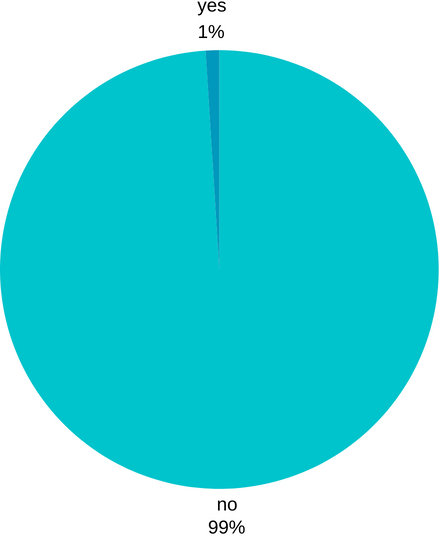
Haha. It's just one! The Color Purple by Alice Walker is 47th on the Great Books list and 7th on the LGBT+ book recs list. There is otherwise no crossover between the top 100s.
Turning to the lists in their entirety, we have a total of 16 books present on both lists; that's 2.4% of the LGBT+ list. Since it's not very many, here's the entire list; the first number is its rank in the Great Books list, the second is its rank on mine. Since so many of the books on my list are tied in terms of number of recs and not really "ranked" the same way, I also included the number of recommendations each received.
- #47 | #7 The Color Purple by Alice Walker (9 recs)
- #78 | #196 Leaves of Grass by Walt Whitman (1 rec)
- #113 | #34 The Picture of Dorian Gray Oscar Wilde (4 recs)
- #147 | #20 Orlando: A Biography by Virginia Woolf (5 recs)
- #153 | #251 The Secret History by Donna Tartt (1 rec)
- #173 | #202 The Heart Is A Lonely Hunter by Carson McCullers (1 rec)
- #181 | #299 A Visit From The Goon Squad by Jennifer Egan (1 rec)
- #214 | #59 Middlesex by Jeffrey Eugenides (3 recs)
- #235 | #203 Brideshead Revisited by Evelyn Waugh (1 rec)
- #284 | #206 Go Tell it on the Mountain by James Baldwin (1 rec)
- #332 | #210 Naked Lunch by William S. Burroughs (1 rec)
- #392 | #1 Giovanni's Room by James Baldwin (13 recs)
- #406 | #247 Bastard Out of Carolina by Dorothy Allison (1 rec)
- #424 | #113 The Fifth Season by N. K. Jemisin (2 recs)
- #449 | #96 Nightwood by Djuna Barnes (2 recs)
- #451 | #99 The Left Hand Of Darkness by Ursula K. Le Guin (2 recs)
And, removing books that only received 1 recommendation on my list (since I did that elsewhere):
- #47 | #7 The Color Purple by Alice Walker (9 recs)
- #113 | #34 The Picture of Dorian Gray Oscar Wilde (4 recs)
- #147 | #20 Orlando: A Biography by Virginia Woolf (5 recs)
- #214 | #59 Middlesex by Jeffrey Eugenides (3 recs)
- #392 | #1 Giovanni's Room by James Baldwin (13 recs)
- #424 | #113 The Fifth Season by N. K. Jemisin (2 recs)
- #449 | #96 Nightwood by Djuna Barnes (2 recs)
- #451 | #99 The Left Hand Of Darkness by Ursula K. Le Guin (2 recs)
While it may be one's inclination to assume that the Great Books list simply excludes LGBT+ literature and that is the reason there is so little overlap, I counted 34 works of LGBT+ and homoerotic literature on the Great Books list that are not included in the LGBT+ recommendations list. That's more than twice what they have in common! To name a few of the most obvious: The Epic of Gilgamesh; American Psycho;; In Cold Blood; A Clockwork Orange; the works of Shakespeare, Proust, and Getrude Stein.
Comparing the "decade published" counts between the two lists:
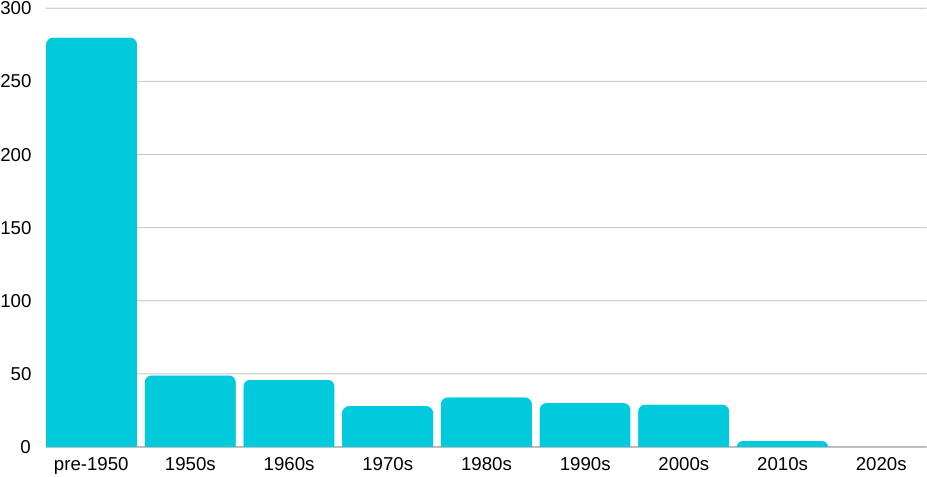

For the Great Books list, that's 280 books published prior to 1950, 49 in the 50s, 46 in the 60s, 28 in the 70s, 34 in the 80s, 30 in the 90s, 29 in the 2000s, 4 in the 2010s, and zero in the 2020s. Very different from the recommended LGBT+ books!
The spread continues to be much more even throughout history: here's an extended bar chart, since so many are pre-1950s!
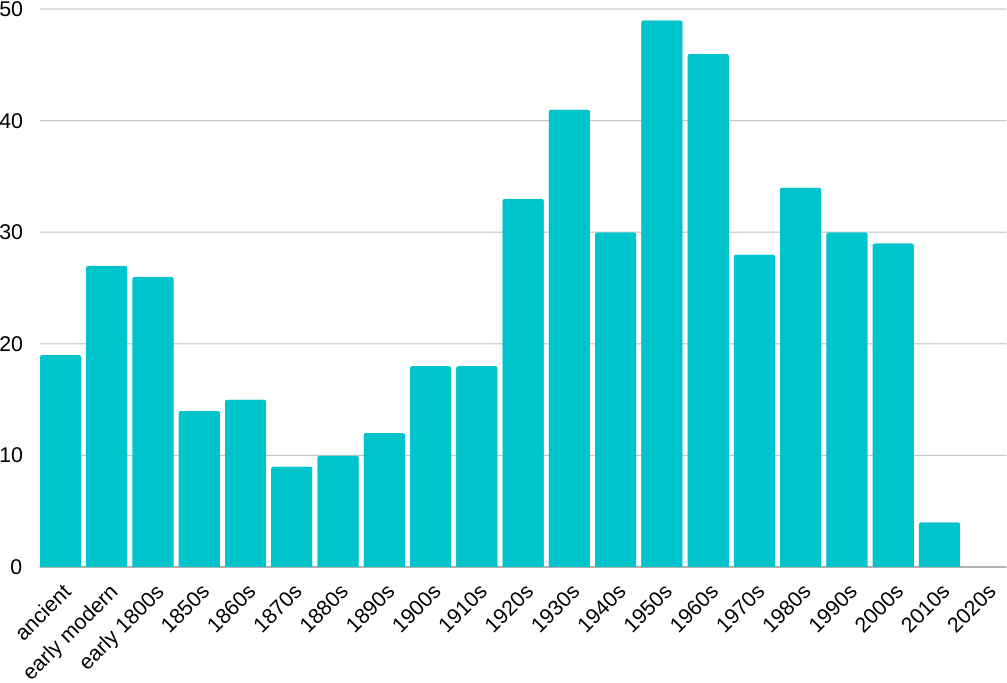
What I Probably Won't Do
While I think it would be really interesting to do a deeper analysis on the content of the books, the types of people represented in the books, and author demographics, I'm hesitant for a few reasons. For one thing, that's a lot of research - 584(at least) different authors, 667 books. It would take a very long time to gather that amount of information!
For another thing: gender and sexual identity are fluid, labels are malleable and mean different things to different people, some people were closeted when a book was published but came out later, the information will not always be available, the meaning/context of categories have changed a lot over time... labeling authors with terms they did not use in life is uncomfortable and, frankly, not conducive to obtaining accurate results.
Even if someone says flat-out "I am straight" in an interview, that doesn't necessarily mean they are straight. Should I go with their stated identity at time of publication? Make multiple columns and do even more research to track all 584 authors' identity evolutions over their lifetime? How do I distinguish between authors who have not said anything one way or another - do I decide they're straight? What about someone who refuses to answer the question or label themselves? Even if someone says they're straight in one source, how much digging do I need to do to make sure that isn't contradicted elsewhere? Is "unlabeled" a satisfactory category, when there is such a significant difference between someone who was probably gay but didn't have that word (Oscar Wilde and Walt Whitman come to mind) and a modern person living today who specifically says "I will not give myself a label for my sexuality"??
Racial demographics are not much less nebulous, and would similarly require a large number of extremely fraught executive decisions. Just for one example: should white Jewish authors be marked as ethnically distinct from white non-Jewish authors? Should they only be marked as ethnically distinct if they're ethnically Jewish?How much research do I need to do in order to make that determination? What about Black Jewish people? Should they be filed under Black or under Jewish or make "Black and Jewish" a separate category? What about people who are ethnically Jewish but don't consider themselves Jewish? Et cetera et cetera et cetera. Every single question and dilemma brought up by the idea of categorizing human people by race is complicated and the subject of many many interconnected conversations about culture, race, time, context, privilege, the state................. et cetera!!!
I could provide basically infinite examples of potential problems but I will refrain. The point is, while it is useful and interesting on a broad scale to have information like "how many of the authors recommended are people of color?" or "how many gay people are on the list vs how many bi people?" or "do trans people write about trans people mostly?" the process of making that determination for each individual is so complicated it just isn't practical. Even if I didn't object to doing it on principle, which I do.
Never say never - I might do a broad look at the author demographics if I can figure out a way to do it that won't make me feel like an asshole AND won't take forever.
In terms of fictional characters in the books, that's something I may go through and note, as the people in question are fake and I thus don't feel bad about labeling them however I please, although it is still VERY TIME CONSUMING beyond the point of practicality and frankly not that interesting to me without the context of the authors' demographics. I'd do it if I was doing this for a grade or a research paper or money or something, but since it's just for my personal edification... ehhhhhhhh.
What I Probably Will Do
- I am going to go through the list and mark which books use the phrase "coming of age" in the summary. Because I feel like it's a lot but maybe not? Again, good to check these things to find out for sure.
- I might go through the "general" fiction and tease apart how much of it is "literary", although that's very vibes-based and might get frustrating fast when I haven't read any of the work.
- Maaaaaaaaaaybe some kind of look at what kind of common adjectives are used to describe a book in its blurbs or goodreads reviews or in the rec lists? IE "cute" "romantic" "sad" "lovely" "scary" etc etc etc? Not sure about that, mulling over how much of a pain in the ass it would be.
- Label and tally up books translated into English from other languages & country of origin. I only noticed a handful of things that weren't originally in English, curious to go back and count them.
If you have suggestions for rec lists I can add to the data, things to do with my spreadsheet, things you'd find interesting to know the numbers on, snippets of code to automate some of this stuff, or whatever else, hit up my guestbook! :) If you'd like to pick a fight with me about YA, click here instead.









.png)
.png)
.png)
.png)







